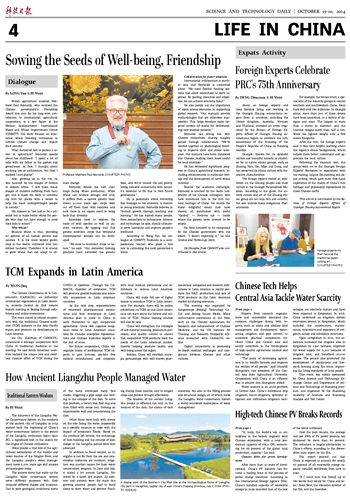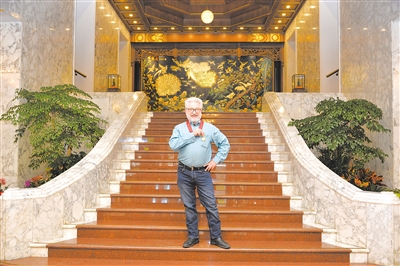
 |
| Professor Matthew Paul Reynolds. (COURTESY PHOTO) |
British agricultural scientist Matthew Paul Reynolds, who received the Chinese government's Friendship Award this year for his long-term contribution to international agricultural cooperation, is a key figure at the Mexico-headquartered International Maize and Wheat Improvement Center (CIMMYT). His work focuses on innovative wheat breeding techniques to combat climate change and ensure food security.
What motivated him to pursue a career in agriculture? Reynolds speaks about his childhood: "I spent a lot of time with my father in the garden and greenhouse. At first, I thought about studying law or architecture, but then I realized I love plants!"
Also, growing up in the 70s, he was haunted by the images of famine in eastern Africa. "I saw these visual images of children suffering from hunger, and it made me want to combine my love for plants with a desire to help the most underprivileged people in society."
His mission is "not just to be a scientist but to make better wheat for people who may not have enough to send their kids to school."
Why wheat?
Because wheat is vital, providing 20 percent of all human protein and calories. It is the most widely grown crop in the world, cultivated over 220 million hectares. Therefore it is crucial to grow wheat that can adapt to climate change.
Reynolds details the vast challenge facing wheat production. While wheat can tolerate drought and cold, it suffers from a narrow genetic base. About 10,000 years ago, crops were cut off from their wild relatives, and now there is an urgent need to bring back that diversity.
Scientists need to explore the traits of wild species as well as ancient varieties. By tapping into this genetic reservoir, crops that withstand environmental stresses can be developed.
"We need to reconnect crops to nature," he says. "Our industrial farming practices have narrowed the genetic base, and we've treated the soil poorly, losing valuable connections with nature. It's essential to fix this to feed future generations."
He is passionate about delivering this message to his students. A mentor to young scientists, Reynolds believes in "mutual growth through teaching and learning." He has trained many people, from researchers to technicians. Science and technology, he says, should ultimately serve humanity and improve people's livelihood.
According to Wang Xin, his colleague at CIMMYT, Reynolds is a compassionate teacher who plays a key role in cultivating the next generation's talent.
Collaboration for faster solutions
International collaboration is another area that Reynolds is concerned about. "We need flexible funding systems that allow researchers to work together. By pooling resources and expertise, we can achieve solutions faster."
He also points out the importance of open-access resources in supporting global research. "Our manuals provide methodologies that are otherwise inaccessible. This helps breeders make targeted crosses (of seeds) for (withstanding) new weather patterns."
Reynolds has strong ties with Chinese researchers, sharing insights gained through collaboration. "We've worked together on physiological breeding to improve yield and stress tolerance. Our manuals have been translated into Chinese, making them more useful for local scientists."
He has witnessed significant progress in China's agricultural research, including advancements in molecular biology and the development of novel wheat cultivars.
Beyond the academic exchanges, Reynolds is touched by the warm hospitality of his Chinese colleagues, who have introduced him to the rich cultural heritage of China. He recalls the many delightful meals they have shared, all punctuated with joyful "Ganbei" — Bottoms up! — toasts where the glasses never seemed to be empty.
He feels honored to be recognized by the Chinese government with the award. "I wasn't expecting it," he told Science and Technology Daily.
He Zhonghu from CIMMYT also contributed to this article.







